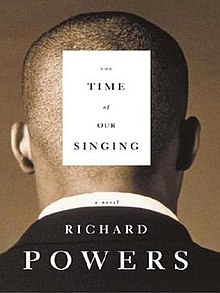 First edition First edition | |
| Author | Richard Powers |
|---|---|
| Language | English |
| Publisher | Farrar Straus & Giroux |
| Publication date | 2002 |
| Publication place | United States |
| Media type | |
| Pages | 640 pp |
| ISBN | 0-374-70467-8 |
| OCLC | 254475480 |
| Preceded by | Plowing the Dark |
| Followed by | The Echo Maker |
The Time of Our Singing (2003) is a novel by American writer Richard Powers. It tells the story of two brothers, Jonah and Joseph Strom, who are involved in music, dealing heavily with issues of prejudice. Their parents, David Strom and Delia Daley, met at Marian Anderson's concert on the steps of the Lincoln Memorial after she had been barred from any other legitimate concert venue. The story goes back and forth between the generations, describing the unusual coupling of a German-Jewish physicist (David) who has lost his family in the Holocaust and a black woman from Philadelphia (Delia), both of whom have strong musical backgrounds. They impart their love of music to their family. Their two boys study music and become professional musicians: one a singer, the other a pianist. The parent's third child, their daughter Ruth, becomes a militant black activist.
This is a complex epic novel juxtaposing historical events throughout most of the 20th century, depicting racism and the development of civil rights efforts and the author's love and knowledge of music and physics. The book can be read on many levels, but those who have at least some familiarity with music will find a plethora of references to music of all eras and styles.
An opera was written based on the book by Kris Defoort. The opera premiered in La Monnaie in Brussels in September 2021.
Music referenced in the book
Powers makes many references to specific composers, musicians and singers in the novel. Below are some examples.
- "Time Stands Still" by John Dowland (1563–1626) - Page 4
- "Carmen" by Georges Bizet - Page 9
- Nina Simone
- Sarah Vaughan
- "Concierto de Aranjuez" by Joaquín Rodrigo
- "Sketches of Spain" by Miles Davis
- "Der Erlkönig" by Franz Schubert
- "Bist du bei mir" attributed to Johann Sebastian Bach, actually by Gottfried Heinrich Stölzel.
- The Visitation by Gunther Schuller
- "Sgt. Pepper's Lonely Hearts Club Band" by The Beatles
- "Yaller" by Cab Calloway
- "A Child of Our Time" by the British composer Michael Tippett
Physics referenced in the book
- General Relativity - Page 9
- Second Law of Thermodynamics - Page 88
Political references
- The Daughters of the American Revolution refused permission for Marian Anderson to sing to an integrated audience in Constitution Hall.
- Black Panther Party
Critical reception
According to Book Marks, based on American publications, the book received "positive" reviews based on nine critic reviews, with one being "rave" and five being "positive" and three being "mixed". The Daily Telegraph reported on reviews from several publications with a rating scale for the novel out of "Love It", "Pretty Good", "Ok", and "Rubbish": Guardian, Independent, Spectator, Literary Review, and TLS reviews under "Love It" and Sunday Telegraph review under "Pretty Good" and Daily Telegraph and Sunday Times reviews under "Ok".
The novel won the 2004 Ambassador Book Award for fiction, won the 2004 WH Smith Literary Award, and was a finalist for the National Book Critics Circle Award the year before.
References
- "The Visitation". usopera.com. Retrieved Nov 28, 2019.
- "The Time of Our Singing". Book Marks. Retrieved 16 January 2024.
- "Books of the moment: What the papers say". The Daily Telegraph. 5 Apr 2003. p. 158. Retrieved 19 July 2024.
- "National Book Critics Circle Award finalists". Retrieved 28 January 2014.
External links
- Bibliography of editions of The Time of Our Singing.
- The Chronicle of Higher Education Review of "The Time of Our Singing" in the context of artistic collaboration between Jewish & African American musicians.
- New York Times Review of "The Time of Our Singing".
| Novels by Richard Powers | |
|---|---|
|
This article about a 2000s novel is a stub. You can help Misplaced Pages by expanding it. See guidelines for writing about novels. Further suggestions might be found on the article's talk page. |